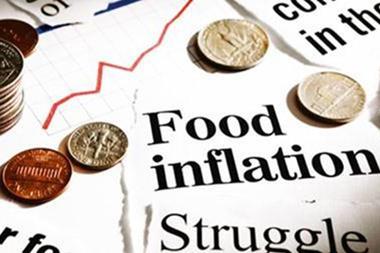
Demand for food aid in the UK is rising, as a series of welfare crises – such as job losses or benefits cuts – are forcing households to turn to food aid as a “strategy of last resort”, a Defra-commissioned report has warned.
Suggestions that greater availability of food aid – particularly through food banks such as those run by the Trussell Trust – was behind the increase proved unfounded, the researchers found.
“Put simply, there is more need and informal food aid providers are trying to help,” the University of Warwick, which led the research, said.
Last July, work and pensions minister David Freud sparked criticism when he said increased demand for food aid was the result of there being more food banks, and not related to the government’s reform of the benefits system.
“We urge the government to learn from it and from those living in harsh circumstances, and to find creative, fair ways to enable all in this rich country to have enough money to be able to eat healthily”
Prof Elizabeth Dowler
Although such food-aid providers were often able to provide short-term relief for crisis-stricken households, they did not help address the underlying causes of food poverty, the researchers added. These included long-term problems such as low income; rising prices for food and other essential household expenses; growing personal debt levels; and sudden “crises” such as job losses and problems with social security benefits.
“All the evidence points to the need for those involved in food security policy and other responses – from across government, business and civil society – to focus on both the short- and long-term causes of household food insecurity to achieve the best outcomes,” the researchers said.
“There is a risk that collecting, sorting and distributing food for people’s immediate needs occupies all available volunteer energy and resources, leaving little focus on developing long-term solutions to household food insecurity.”
Last resort
There was considerable stigma attached to using food aid, and households struggling with food poverty therefore used a variety of coping mechanisms, including “cutting back on other household expenditure; reducing heat or electricity consumption; adjusting food patterns by bulk buying, looking for bargains; purchasing supermarket own brands; and throwing less food away”, the report said. Turning to food aid was usually a “strategy of last resort”.
The report – ‘Household Food Security in the UK’ (PDF) – was commissioned by Defra to review and assess the state of food aid provision in the UK. It was compiled by the University of Warwick alongside the Food Ethics Council.
Research for the report was conducted in early 2013, and Defra has been criticised for “delaying” its publication. In November, the all-party group on hunger and food poverty wrote a letter to Defra secretary of state Owen Paterson, urging him to publish the report “as a matter of urgency”.
Professor Elizabeth Dowler of the University of Warwick said today: “We are delighted our report has been published. We urge the government to learn from it and from those living in harsh circumstances, and to find creative, fair ways to enable all in this rich country to have enough money to be able to eat healthily. This work is urgent.”
Commenting on the publication of the report, the government said: “Charities such as food organisations have always provided a valued service to those in need in their communities, in addition to the safety net provided by governments, and we should welcome the help they provide. That is why this government has given Jobcentre Plus advisers the ability to say to people who need help that they can go to a food bank.
“The literature review published today was commissioned as part of Defra’s general work on food in the UK to see what information was available on the issue.”
Overall, the report concludes there is insufficient information available to answer conclusively many key questions around food aid provision in the UK, and recommends further research be done. But the University of Warwick said despite the “general lack of systematic, published UK research on the drivers of food aid use and trends”, it had been possible to draw the conclusions highlighted above from the available evidence.
Dan Crossley, executive director of the Food Ethics Council, said: ”The evidence indicates that informal food aid in the UK does not address the underlying drivers behind people being unable to afford to eat, and to eat healthily. Food banks - and other types of food aid provision - are intended to be an emergency, short-term response and not a long-term solution. We need additional research, but we also need urgent action - from all sides - to address the root causes of food poverty.”
Earlier today, the Daily Mirror published an open letter from 27 Anglican bishops to David Cameron, in which they criticised the government for creating a national food poverty crisis through cutbacks to the benefits system.



















No comments yet